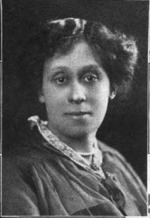Eva del Vakia Bowles facts for kids
Quick facts for kids
Eva del Vakia Bowles
|
|
|---|---|

1918
|
|
| Born | January 24, 1875 Albany, Athens County, Ohio
|
| Died | June 14, 1943 (aged 68) |
| Nationality | American |
| Other names | Eva D. Bowles |
| Occupation | educator, social worker, organizer |
| Years active | 1905–1943 |
| Known for | first black women to hold the position of general secretary of the YWCA |
Eva del Vakia Bowles (1875 – 1943) was an American teacher and a leader for the Young Women's Christian Association in New York City. She became the first black woman to be a main leader (general secretary) of the YWCA. This happened when she started working at the YWCA in Harlem, which was a separate branch for black women.
For 18 years, Eva Bowles helped set up YWCA branches for black communities. She also made their services better and available to more people. Former President Theodore Roosevelt even recognized her work during World War I. She helped the separate YWCA branches a lot during that time.
Contents
Eva Bowles' Early Life
Eva del Vakia Bowles was born on January 24, 1875. Her hometown was Albany, Ohio. Her parents were Mary Jane (Porter) and John Hawkes Bowles.
Her Family's Achievements
Eva's father, John Hawkes Bowles, was the first black principal of a school in Marietta, Ohio. Later, he became one of the first black railroad postal clerks in Ohio. Her grandfather, John Randolph Bowles, was a Baptist minister. He also served as a chaplain for the 55th Massachusetts Infantry Regiment. This was a unit during the Civil War.
Eva's Education
Eva went to public schools in Albany. After that, she continued her education at Bliss Business College in Columbus, Ohio. She also took summer classes at Ohio State University.
Eva Bowles' Career
Eva Bowles started her career as a teacher. She taught at several colleges for black students. These included Chandler Normal School in Lexington, Kentucky, St. Augustine’s College in Raleigh, North Carolina, and St. Paul’s School in Lawrenceville, Virginia.
Joining the YWCA
In 1905, while teaching in Virginia, Eva met Addie Waites Hunton. Addie's husband worked for the Colored Young Men's Christian Association. Addie asked Eva to lead a new project for the YWCA in New York. This project aimed to help black women. Eva took the job later that year. She became the first black woman to work as a YWCA secretary in the United States. In 1908, she studied social work at Columbia University.
Expanding YWCA Services
After her studies, Eva Bowles worked as a caseworker in Columbus, Ohio, from 1908 to 1912. She returned to New York in 1913. There, she became a secretary on the national board of the YWCA's Subcommittee for Colored Work. Her main goal was to increase services for black women.
Even though YWCA branches were separate (segregated), Eva suggested that each town should have only one "Y." White branches usually had more money and better buildings. Eva believed this structure would let women of both races work together.
World War I Efforts
During World War I, the YWCA provided money to help black communities even more. They opened centers for industrial work and places for fun activities. They also opened 15 canteens. These were places that offered entertainment for soldiers and their families.
Eva Bowles was very good at recruiting people. She increased the black staff from just one person to over 60. Former President Theodore Roosevelt gave her $4,000 from his Nobel Prize money. He also praised her for her important work.
Pushing for More Representation
Eva Bowles kept asking the national YWCA board for more black women to be leaders. In 1924, black women got their first representative on the national board. Eva also helped increase the black staff at the main office to nine members. Three black field workers were also added. She traveled across the country, opening new YWCA branches. She also pushed for the organization to expand its work in Africa and the Caribbean.
Leaving the YWCA
In 1932, Eva resigned from the YWCA. She was not happy with their new plans for how the organization would work. Before leaving, she was already working for the National Colored Merchants Association. She was also the chair of the women’s auxiliary for the National Negro Business League. After leaving the YWCA, she joined their joint offices. Her new role was to help improve economic chances for black people.
In 1943, when World War II started, Eva Bowles got a new job. She was named Executive Director of Civilian Defense for the Harlem and Riverside areas of New York City.
Death and Legacy
Eva Bowles died on June 14, 1943. She passed away at the Richmond Community Hospital in Richmond, Virginia. She was visiting her niece at the time.
The YWCA archives keep many records about Eva Bowles' work. These records show how she helped expand the YWCA in African American communities. They also show her important work during the First World War.

